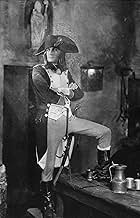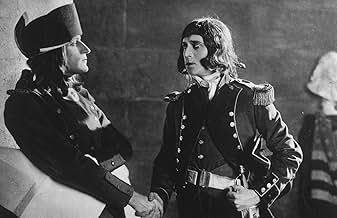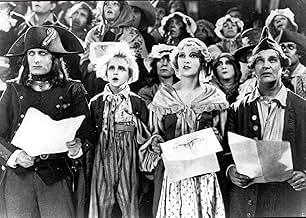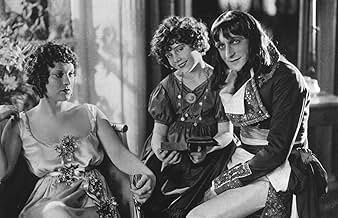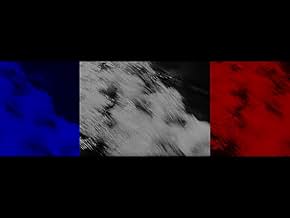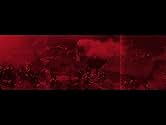IMDb RATING
8.2/10
9.5K
YOUR RATING
A film about the French general's youth and early military career.A film about the French general's youth and early military career.A film about the French general's youth and early military career.
- Awards
- 4 wins total
Nicolas Roudenko
- Napoléon Bonaparte enfant
- (as Vladimir Roudenko)
Max Maxudian
- Barras
- (as Maxudian)
- Director
- Writer
- All cast & crew
- Production, box office & more at IMDbPro
Featured reviews
10Quibble
I was lucky enough to see the very latest restoration of Napoleon by silent film expert Kevin Brownlow at the Royal Festival Hall in London earlier this month (December 2004). Carl Davis was there in person to conduct the London Philharmonic Orchestra in a live performance of his own brilliant score. It was the most moving and overwhelming cinematic experience of my life and I doubt whether it can ever be bettered. The film is decades ahead of its time, the bravura editing and inspired direction reveal Gance as the true genius that he was.
However...
The very performance I attended was under legal threats from Coppola, who wished to ban its screening. Back in 1980-81, he and his Zoetrope Studio helped fund a restoration and he got his father to compose a score. He helped get the US audiences to recognise what a remarkable work of genius Napoleon really is, and all credit to him for trying to do so. This would all seem very well and good, but even in 1981 Coppola wasn't showing the best version of the restored film that he could have. He had cut it down from Brownlow's (then) latest version to fit the score his father had written. He also showed it at 24 fps instead of the intended (and more realistic - the movements are at a normal rate, not unnaturally sped-up) 20 fps. Throughout the 1980s, Brownlow and others in Europe kept finding better elements and more footage. Yet, Coppola's version was still being called "THE restoration" and not altered at all. Brownlow also found prints with more authentic editing, giving a much better idea of the order and number of cuts in many sequences (so many versions/reels of Napoleon have had inferior takes/editing put in by people other than Gance that it took time to discover the best and most authentic). It was becoming increasingly clear that Coppola's version was very much flawed and out-of-date with the new discoveries. In 2000, the latest and most complete version available (including the authentic tints, near-definitive editing in line with Gance's intentions, and the best print so far etc.) was screened in London. Carl Davis had altered and lengthened his magnificent score to match the latest version. Even after this showing in 2000, elements were still being improved to make the film as close as possible to Gance's intentions. The 2004 screening which I attended had a print that ran for nearly 5 and a half hours. Coppola's version runs for less than 4 hours and it hasn't been touched to include any improvements in print quality or more authentic tinting or editing.
The Coppola version of Napoleon, with a run time of 223 minutes (3 hours and 43 minutes) is out on DVD in Australia. I do not know when or even if it will come out on DVD in the US. Rest assured, it will NOT be the best version of this great film, or anything close to it. Coppola and Zoetrope sold rights to their version of the film to Universal in the 1980s and so now the issue of rights has become entangled with a major studio (Universal Studios, incidentally, destroyed all their silent film negatives in 1947 - a very (in)appropriate choice of distributor for a film whose failure and subsequent neglect was mainly due to a horrendous re-editing by studios (MGM) in 1927).
The Australian DVD, released by Universal, is filled with faults. Apart from inferior image quality (unlike the 2004 print, which was superb and scarcely a speck of dirt was visible any time during the whole 5 and a half hours), the final triptych sequence is horrendously cropped from 3.99:1 to 2.55:1 and isn't even adjusted for widescreen televisions. It's also exactly the same version from 1981 which, even back then, wasn't the best there was available. The music, admirable though it is, cannot compare to Davis' score (he has worked on many other silent film scores with great acclaim) - especially now that Davis has reworked the score for the latest version.
Coppola's efforts to suppress the latest restoration are a dreadful example of precisely the kind of money-driven censorship and selfishness that Napoleon has been dogged by for eighty years. Not just the 90+ minutes of extra footage, but the score and print quality itself, makes the latest print by the BFI/BFA/Brownlow indispensable. Anyone who claims to have rescued this film (as Coppola did in 1981, even though Brownlow had been working for decades before then, alongside Gance himself, to remaster the film) and yet tries to ban a closer version to the original film is monstrously hypocritical. As much as I welcome any hope of seeing Napoleon on DVD, I recoil at the thought of thousands of people being forced to watch a terribly flawed and inferior version of this masterpiece. Even as I type, there are rumours of even more lost footage from Napoleon being found in Denmark - with any luck this will lead to an even better restoration than the 2004 one.
This ongoing saga of restoration (and much credit is due to the person who seems to have the least legal rights out of the whole cast of those involved in the restored film: Kevin Brownlow) means that a DVD release of the Coppola version, with its many flaws, seems absurd and remarkably selfish and damaging. This film desperately needs to be released on DVD, but only in as close a form as possible to Gance's original masterpiece of 1927, seen by far too few people. That US rights-holders are trying to ban better versions with over 90 minutes extra in them is just another sad chapter in the story of this much-abused wonder of cinema. This is a magnificent film and deserves better than the shoddy and selfish treatment it has been given in America.
However...
The very performance I attended was under legal threats from Coppola, who wished to ban its screening. Back in 1980-81, he and his Zoetrope Studio helped fund a restoration and he got his father to compose a score. He helped get the US audiences to recognise what a remarkable work of genius Napoleon really is, and all credit to him for trying to do so. This would all seem very well and good, but even in 1981 Coppola wasn't showing the best version of the restored film that he could have. He had cut it down from Brownlow's (then) latest version to fit the score his father had written. He also showed it at 24 fps instead of the intended (and more realistic - the movements are at a normal rate, not unnaturally sped-up) 20 fps. Throughout the 1980s, Brownlow and others in Europe kept finding better elements and more footage. Yet, Coppola's version was still being called "THE restoration" and not altered at all. Brownlow also found prints with more authentic editing, giving a much better idea of the order and number of cuts in many sequences (so many versions/reels of Napoleon have had inferior takes/editing put in by people other than Gance that it took time to discover the best and most authentic). It was becoming increasingly clear that Coppola's version was very much flawed and out-of-date with the new discoveries. In 2000, the latest and most complete version available (including the authentic tints, near-definitive editing in line with Gance's intentions, and the best print so far etc.) was screened in London. Carl Davis had altered and lengthened his magnificent score to match the latest version. Even after this showing in 2000, elements were still being improved to make the film as close as possible to Gance's intentions. The 2004 screening which I attended had a print that ran for nearly 5 and a half hours. Coppola's version runs for less than 4 hours and it hasn't been touched to include any improvements in print quality or more authentic tinting or editing.
The Coppola version of Napoleon, with a run time of 223 minutes (3 hours and 43 minutes) is out on DVD in Australia. I do not know when or even if it will come out on DVD in the US. Rest assured, it will NOT be the best version of this great film, or anything close to it. Coppola and Zoetrope sold rights to their version of the film to Universal in the 1980s and so now the issue of rights has become entangled with a major studio (Universal Studios, incidentally, destroyed all their silent film negatives in 1947 - a very (in)appropriate choice of distributor for a film whose failure and subsequent neglect was mainly due to a horrendous re-editing by studios (MGM) in 1927).
The Australian DVD, released by Universal, is filled with faults. Apart from inferior image quality (unlike the 2004 print, which was superb and scarcely a speck of dirt was visible any time during the whole 5 and a half hours), the final triptych sequence is horrendously cropped from 3.99:1 to 2.55:1 and isn't even adjusted for widescreen televisions. It's also exactly the same version from 1981 which, even back then, wasn't the best there was available. The music, admirable though it is, cannot compare to Davis' score (he has worked on many other silent film scores with great acclaim) - especially now that Davis has reworked the score for the latest version.
Coppola's efforts to suppress the latest restoration are a dreadful example of precisely the kind of money-driven censorship and selfishness that Napoleon has been dogged by for eighty years. Not just the 90+ minutes of extra footage, but the score and print quality itself, makes the latest print by the BFI/BFA/Brownlow indispensable. Anyone who claims to have rescued this film (as Coppola did in 1981, even though Brownlow had been working for decades before then, alongside Gance himself, to remaster the film) and yet tries to ban a closer version to the original film is monstrously hypocritical. As much as I welcome any hope of seeing Napoleon on DVD, I recoil at the thought of thousands of people being forced to watch a terribly flawed and inferior version of this masterpiece. Even as I type, there are rumours of even more lost footage from Napoleon being found in Denmark - with any luck this will lead to an even better restoration than the 2004 one.
This ongoing saga of restoration (and much credit is due to the person who seems to have the least legal rights out of the whole cast of those involved in the restored film: Kevin Brownlow) means that a DVD release of the Coppola version, with its many flaws, seems absurd and remarkably selfish and damaging. This film desperately needs to be released on DVD, but only in as close a form as possible to Gance's original masterpiece of 1927, seen by far too few people. That US rights-holders are trying to ban better versions with over 90 minutes extra in them is just another sad chapter in the story of this much-abused wonder of cinema. This is a magnificent film and deserves better than the shoddy and selfish treatment it has been given in America.
At the weekend i went to see Napoleon at the Royal Festival Hall in London. I am a relative newcomer to silent moves but too see a 5 and a half hour performance with the London Philarmonic Orchestra was incredible. Loved it, there seems to be some dispute with Coppola about the rights to this production, but if it is ever done again, it is something that any serious movie goer should make an attempt to see. And to prevent others from seeing this with an orchestra would be a travesty. The music by Carl Davies added another dimension to what was a fantastic film. It would appear that the work is a lifes work for Kevin Brownlow, he should be very proud of this acheivements.
Abel Gance's 'Napoleon' was premiered on April 7, 1927, at the Paris Opera House, the first movie to be accorded such an honor
It was been shown on a triple screen and to full orchestral accompaniment, running slightly under four hours
Impressive as it seems, it was conceived as the first of a six-part biography running many hours and tracing the life of Napoleon from childhood to the bitter end in St Helena Fortunately-for Abel Gance who directed and for us-the project was only completed to that moment where Napoleon enters Italy at the head of the French army, and the later and less pleasant aspects of his spectacular career were left unfilmed... The Little Corporal, after all, is a less controversial figure than the Emperor
Gance needed a figure as emblematic and powerful as 'Napoleon' to fulfill his dream of super cinema
'Napoleon' is a masterpiece of excess:
'Napoleon' is like one grand musical composition. It throbs with life
That was Gance the great filmmaker who thought that film could do everything and who said to Kevin Brownlow: 'For me, the cinema is not just pictures. It is something great, mysterious and sublime.' Brownlow is known now not only as an English filmmaker and film historian but also as a great restorer of silent films, notably Abel Gance's 'Napoleon.'
Impressive as it seems, it was conceived as the first of a six-part biography running many hours and tracing the life of Napoleon from childhood to the bitter end in St Helena Fortunately-for Abel Gance who directed and for us-the project was only completed to that moment where Napoleon enters Italy at the head of the French army, and the later and less pleasant aspects of his spectacular career were left unfilmed... The Little Corporal, after all, is a less controversial figure than the Emperor
Gance needed a figure as emblematic and powerful as 'Napoleon' to fulfill his dream of super cinema
'Napoleon' is a masterpiece of excess:
- The child Bonaparte keeps a pet eagle and wins a snow fight while at school in Brienne... In this sequence, the frame splits into nine subliminal images; as Napoleon watches his men entering Italy, the screen expands on each side to form a breathtaking panorama, then changes into three coordinated views of the scene
- The National Convention seems to sway and rock as Napoleon makes his escape from Corsica in a storm-tossed sailboat
- The Gallic of cabaret singers, Damia, leads French troops into battle personifying 'La Marseillaise'
'Napoleon' is like one grand musical composition. It throbs with life
That was Gance the great filmmaker who thought that film could do everything and who said to Kevin Brownlow: 'For me, the cinema is not just pictures. It is something great, mysterious and sublime.' Brownlow is known now not only as an English filmmaker and film historian but also as a great restorer of silent films, notably Abel Gance's 'Napoleon.'
I had the privilege of seeing the restored version of this film, to the accompaniment of a live orchestra under the baton of Carmine Coppola, in Los Angeles' un-air-conditioned war memorial. Despite uncomfortable seating and terrible heat, the experience of this four hour movie remains a watershed for anyone who attended. To think that because of the invention of sound, this masterpiece was partially destroyed by Abel Gance in a fit of depression, is heartbreaking. More shocking is that Gance's invention of Cinemascope - of which today only the end of the film retains in its triptych screen effect - was lost to filmgoers until its reinvention years later.
Obviously true art can't be hidden forever, and Gance did live to see Napoleon take its rightful place in cinematic history. Though it is many years later, I can still remember the tears and the ovation when the black screen with the white signature, "Abel Gance", signified the end of the film. A compelling and great work of art.
Obviously true art can't be hidden forever, and Gance did live to see Napoleon take its rightful place in cinematic history. Though it is many years later, I can still remember the tears and the ovation when the black screen with the white signature, "Abel Gance", signified the end of the film. A compelling and great work of art.
I saw this back in '81 or '82, on the Big Screen at the Shrine Auditorium in Los Angeles, with Carmine Coppola conducting a live orchestra -- there has never been anything like that in all my movie-going experience! The closest that's come since was _Intolerance_, restored, with another live orchestra performing under the baton of the composer, Gillian Anderson (no, not the one from the X-Files). That, too, was an occasion to remember ... but where is Napoleon on DVD?
As many other reviewers have said, Napoleon was a relevatory experience. Certainly, other films to that point had used most of the devices Gance employed so brilliantly (except, of course, his three-screen-wide "Polyvision"), but then sound came in and the requirements of the microphone killed the recently mobilized camera. The camera became very static for at least the next ten years of films -- dynamic camera movements only returned when sound mixing came in to being, and scenes could be shot MOS (mit out sound), with foley and overdubbing replacing the missed sounds.
For this reason, Napoleon is important to see -- as a technical achievement. But Gance's artistry wasn't limited to gimmicks. His pacing, editing, and direction of the actors (including Dieudonne as Nappy -- looking amazingly Rod-Stewart-like) is excellent as well.
Highly recommended -- and when the DVD comes out -- hopefully, with the fuller, five-hour restoration, and Coppola's music on one track, with a reconstruction of the original music on another (and perhaps Gillian Anderson has a score of her own to share?) -- you'll owe it to yourself, as a student of Film, to see it, over and over again.
As many other reviewers have said, Napoleon was a relevatory experience. Certainly, other films to that point had used most of the devices Gance employed so brilliantly (except, of course, his three-screen-wide "Polyvision"), but then sound came in and the requirements of the microphone killed the recently mobilized camera. The camera became very static for at least the next ten years of films -- dynamic camera movements only returned when sound mixing came in to being, and scenes could be shot MOS (mit out sound), with foley and overdubbing replacing the missed sounds.
For this reason, Napoleon is important to see -- as a technical achievement. But Gance's artistry wasn't limited to gimmicks. His pacing, editing, and direction of the actors (including Dieudonne as Nappy -- looking amazingly Rod-Stewart-like) is excellent as well.
Highly recommended -- and when the DVD comes out -- hopefully, with the fuller, five-hour restoration, and Coppola's music on one track, with a reconstruction of the original music on another (and perhaps Gillian Anderson has a score of her own to share?) -- you'll owe it to yourself, as a student of Film, to see it, over and over again.
Did you know
- TriviaAbel Gance remembered one scene that was removed by the censors--that of the execution of civilians by soldiers. The camera is used like a bullet, zooming towards one human target, then another, then another. The sequence is lost, although a still photograph does survive.
- GoofsOne of the Corsicans in the inn states "Our fatherland is Italy with the Duke of Savoy". The Duchy of Savoy had ceased to exist in 1713 (eighty years earlier), when the Duchy acquired the Kingdom of Sardinia and the Duke then bore the title of the King of Sardinia. Italy was a geographic place not a political entity at this time.
- Alternate versionsThere are apparently at least 19 different versions of this film, starting with the original 6-hours cut (in a "triptych" format, requiring three projectors on three screens, called Polyvision). It has been shown in various formats and different running times, including a 1934 version re-edited by director Abel Gance and featuring an added soundtrack.
- ConnectionsEdited into Napoléon Bonaparte (1935)
- SoundtracksThe Thrill of Being In Love (Love Theme of Napoleon and Josephine)
Music by Carmine Coppola
Lyrics by Italia Coppola (USA version)
UK version: score by Carl Davis (based largely on works by Beethoven)
- How long is Napoleon?Powered by Alexa
Details
- Release date
- Country of origin
- Language
- Also known as
- Napoleon
- Filming locations
- Domaine des Milelli, Ajaccio, Corse-du-Sud, France(Paolists' attack on Bonapartes' country house)
- Production companies
- See more company credits at IMDbPro
Box office
- Budget
- FRF 20,000,000 (estimated)
- Gross worldwide
- $39,448
- Runtime
- 5h 30m(330 min)
- Color
- Sound mix
- Aspect ratio
- 1.33 : 1
Contribute to this page
Suggest an edit or add missing content


